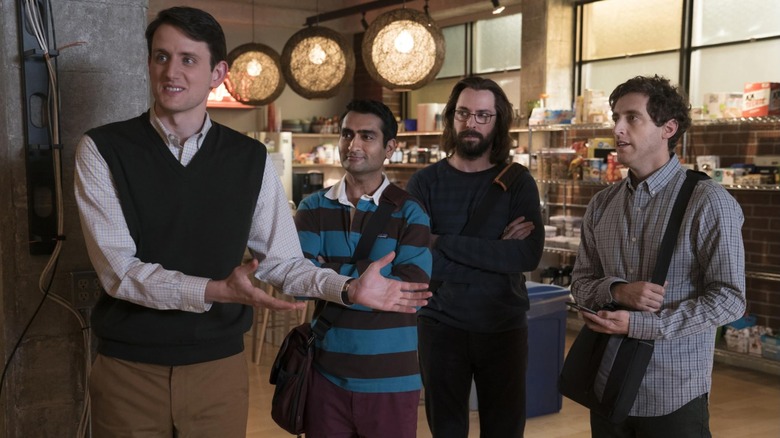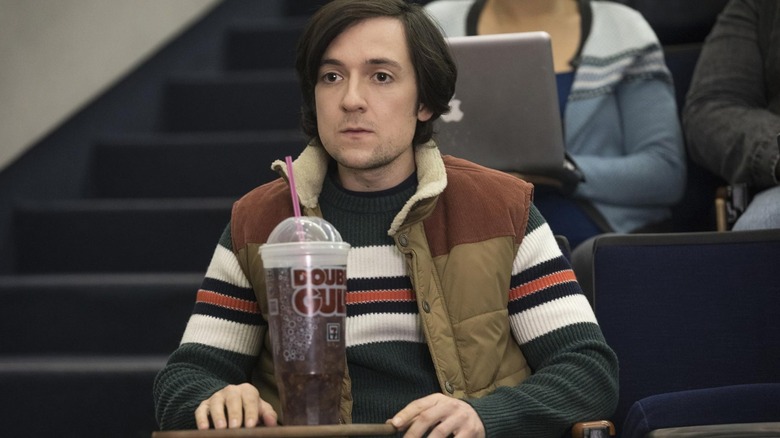Why HBO's Silicon Valley Ended After 6 Seasons
In the tech business, timing is everything. Similarly, according to Mike Judge and Alec Berg, the HBO comedy "Silicon Valley" got out of the game at the right time.
In an interview around the time of the series' 2019 finale, series co-creator Judge and director and executive producer Berg sat down with The Hollywood Reporter to explain why the Thomas Middleditch-led geek comedy had to end after six seasons. "It just felt like we can only have them keep failing for so long without it getting old," Judge reasoned. "I didn't want to run it into the ground. And hopefully, we didn't."
Along with Middleditch, who played anxiety-addled Pied Piper CEO Richard, the show featured an ensemble including Martin Starr, Kumail Nanjiani, Zach Woods, Jimmy O. Yang, and Josh Brener (original castmate T.J. Miller left the show after Season 4). The irony-heavy series featured an onslaught of highs and lows for the unlucky geniuses at its center, and ended with a finale in which the fate of the free world was literally in Richard's hands.
Judge told THR that the show's writers began penning Season 6 scripts with "an open mind about possibly having a seventh [season]," but that once they dug into the storyline, Season 6 seemed like "the right time to bring it all to a head." Berg noted that by 2019, he, Judge, and the cast all had busy schedules outside of "Silicon Valley," and that "everybody just felt like it would be a shame if it started to decay as we were doing it." In the years since the series wrapped, Nanjiani joined the Marvel Cinematic Universe, Judge relaunched "King of the Hill" on Hulu, and Berg earned acclaim (and multiple Emmy nominations) for his work on "Barry." The tech industry changed, too, in a way that Berg and Judge seemed to foresee in 2019.
The real-life tech industry kept raising the stakes for the HBO series
"When we started, it was just guys trying to make their little thing work and make some money. And by the end, it had evolved into this thing where it was a group of people who are literally trying to save the world," Berg noted at the time. While the constant stakes-raising helped the show, he said, it also "made it a lot harder to just be fun and loose and goofy and just make jokes because there was a real weight and import to what was going on."
That story arc was reflected in the real world, where tech billionaires were regularly showing up in court and in Congress. "You get to this place where people are making very sustainable arguments that Facebook and Twitter and these other companies have torn the fabric of society irreparably," Berg said. "Facebook is destroying the world, you could argue. And it ceases to just become a goofy, fun little show."
As Judge put it, "Facebook's motto back then was 'move fast and break things,' and it's little less cute now that they actually have moved fast and broken things." Berg compared "Silicon Valley" to "Veep," another series that went from outlandishly funny to painfully accurate as the "vapid and narcissistic" American politicians at its core began to bear resemblance to those in real life. He also compared the decision to end "Silicon Valley" on a high note to his early job on "Seinfeld," a massive show that came to a screeching halt when its star turned down a lucrative Season 10 offer. Jerry Seinfeld, Berg says, "always felt like, 'Look, it's better to get out on a high note than feel like you stayed one day too long.'" Seems like Pied Piper, like many of the wealthy tech gurus it satirized, cashed out just in time.

